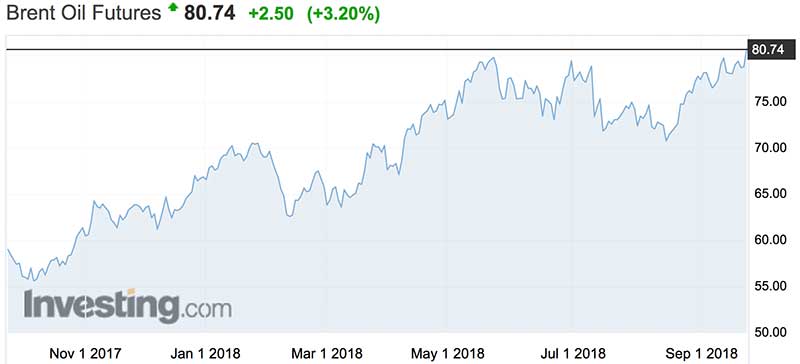The risk of a ‘major miscalculation’ by Trump could drive oil to $US90: JPMorgan
Energy
Energy
Markets have recently reacted to US President Donald Trump’s escalating trade war with China with little more than a shrug.
JPMorgan analysts are starting to find that worrying.
“US economic and equity market resilience” will “embolden the president on all geopolitical fronts — autos, NAFTA and particularly Iran,” they wrote in a September 21 note.
The result is a risk of “a major miscalculation from sanctions that are tough to calibrate.”
Fresh US sanctions on Iran are due to come into force on November 4 and JPMorgan thinks Trump could hold a tougher line on them than past administrations. That could mean a greater than previously expected fall in oil exports from Iran.
“With the US proving more aggressive geopolitically, and less likely to grant waivers, we now model a loss of 1.5 million barrels per day,” the bank said.
The risk of a miscalculation in part drove JPMorgan to upgrade its oil price forecasts for the next few quarters.
The bank now expects Brent to reach $US85 a barrel over the next six months, up from a previous forecast around the low $US60s. A “spike” to $US90 a barrel is likely, they said.
Overnight the price passed $US80 — its highest point since November 2014.
“The main driver of this revision is a higher estimate of how much Iranian crude exports might decline due to multi-country respect for US sanctions that should come into effect on November 4,” JPMorgan said.

Elsewhere in the note, JPMorgan said the ongoing trade conflict between the US and China looks “disturbing over the medium-term”.
The latest round of tariffs on Chinese imports came into effect just after midnight on Monday morning Washington time.
The duties hit $US200 billion worth of imports ranging from agricultural products like fruit to consumer goods like furniture to industrial items like chemicals.
China has promised to respond with tariffs on $US60 billion worth of US imports.
JPMorgan analysts said in the report on Friday: “It has always been challenging to establish with any confidence how much trade conflict financial markets have been discounting, so we respect this week’s market moves as indicating that investors were expecting more aggression than what the US delivered.”
This article first appeared on Business Insider Australia, Australia’s most popular business news website. Read the original article. Follow Business Insider on Facebook or Twitter.